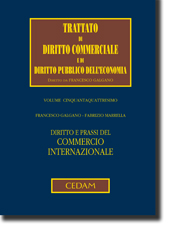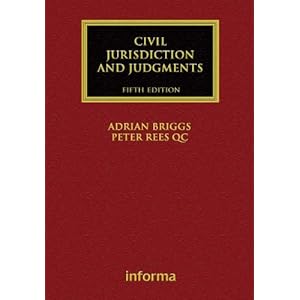On Thursday, 18 March 2010, the weblog of the Journal of Intellectual Property Law and Practice published a piece of news under the title “Exclusive jurisdiction clauses and antisuit injunctions”, on a new English case on anti-suit injunctions under the Brussels Regulation (the “other” State being a third State). I have been allowed to reproduce the facts of the case; an analyse by David Wilson and Joanna Silver is to be found here.
Many thanks to the authors and to Professor Jeremy Phillips, blogmaster of the JIPLP weblog
“Skype, domiciled in Luxembourg, offered free-to-download software that enabled users to communicate over the internet. Joltid, a BVI company, owned certain software that was integral to Skype’s business. Skype and Joltid entered into a written agreement, by which Joltid granted Skype a worldwide licence to use a form of its software, the object code, but retained sole control of the source code. Clause 19.1 of the licence stated:
Any claim arising under or relating to this Agreement shall be governed by the internal substantive laws of England and Wales and the parties submit to the exclusive jurisdiction of the English courts.
In March 2009 Joltid, claiming that Skype had breached the licence by using and accessing the source code, purported to terminate it. In response, Skype commenced proceedings in England, claiming that the purported termination was invalid and the licence remained in force. Skype accepted that it had used the source code, but denied this was a breach. According to Skype, Joltid had supplied the source code rather than the object code. This amounted to a variation of the licence. If not, Joltid was estopped from alleging breach or had waived the right to demand strict compliance. In response, Joltid sought a declaration that the licence was validly terminated, as well as an injunction and financial remedies. Joltid subsequently registered its copyright in the source code in the USA and commenced proceedings in the USA against Skype and its various investors (which were not parties to the licence) for copyright infringement.
Skype claimed that these US proceedings were in breach of clause 19.1 of the licence and sought an anti-suit injunction in the UK proceedings to restrain them. Since Skype was domiciled in Luxembourg, Article 23(1) applies in relation to clause 19.1 of the licence. Lewison J began by assessing whether the claims against Skype in the US proceedings fell within the scope of clause 19.1. Joltid argued that its claims in the US proceedings did not arise out of the licence since they were predicated on the assumption that the licence had been terminated. Lewison J rejected this interpretation as unduly narrow. Interpretation of a jurisdiction clause is a matter of national law (Benincasa, Knorr-Bremse (supra), and in Fiona Trust, Longmore LJ in the Court of Appeal, applauded by Lord Hoffmann in the House of Lords, stated that ‘the words “arising out of” should cover “every dispute except a dispute as to whether there was ever a contract at all”’. Lord Hoffmann added that clause construction should start from the assumption that commercial parties are likely to have intended that all disputes are to be decided by the same tribunal. Accordingly, Lewison J concluded that the US proceedings initiated by Joltid did relate to a dispute covered by clause 19.1.
The court then considered whether Skype was entitled to an anti-suit injunction to prevent any further steps being taken in the US proceedings. Lewison J began by agreeing with Skype that, following Owusu, the UK court should not decline to exercise its exclusive jurisdiction under Article 23(1) on the basis of discretionary considerations such as forum non conveniens and that the UK proceedings should not therefore be stayed in favour of the US proceedings. Lewison J rejected Skype’s argument that the tests for staying domestic proceedings and granting anti-suit injunctions were ‘two sides of the same coin’ and that it followed that, if the court could not stay its own proceedings, it must grant an anti-suit injunction. In Turner and West Tankers, the ECJ held that where proceedings are initiated in another Member State in breach of a jurisdiction or arbitration clause, a court should not grant an anti-suit injunction; it is for each court to rule on whether it has jurisdiction to resolve the dispute before it. Skype argued that this line of authority only applies where both jurisdictions are Member States, but Lewison J rejected this. He noted that Skype’s argument that there was no discretion to stay the UK proceedings was founded on Owusu, where the ECJ drew no distinction between Member and non-Member States. Thus if Skype was right about this issue, the ECJ’s approach to anti-suit injunctions must also be equally applicable in the case of non-Member States. Nonetheless Lewison J concluded that, as a matter of discretion, an anti-suit injunction should be granted. Since there was no dispute that the licence was valid, even if terminated, there was a breach of clause 19.1 and the court would need a good reason before declining to enforce by injunction the parties’ contractual bargain on jurisdiction. There was no such reason here. Lewison J considered that the standard forum non conveniens arguments prayed in aid by Joltid should be given little weight where, as here, the parties to an agreement of worldwide application deliberately agreed an exclusive jurisdiction clause appointing a neutral territory, and where such factors were eminently foreseeable when the parties entered into the licence. Otherwise, the clause would be deprived of its intended effect since, the more ‘neutral’ the forum chosen, the less importance the parties must have placed on its convenience for any particular dispute. Another important factor was whether the grant or refusal of the injunction would enable all disputes between the parties to take place in a single forum. In this case, the court’s decision either way could not avoid the risk of parallel proceedings; following Owusu, the court could not stay the UK proceedings, but it had no jurisdiction to restrain the US proceedings in respect of the parties that did not have the benefit of the exclusive jurisdiction clause.”





 Just in case you have not already ordered your copy, or one for your library, the 5th edn (2009) of Briggs & Rees, Civil Jurisdiction and Judgments is available. Insofar as there is blurb available, here it is:
Just in case you have not already ordered your copy, or one for your library, the 5th edn (2009) of Briggs & Rees, Civil Jurisdiction and Judgments is available. Insofar as there is blurb available, here it is: